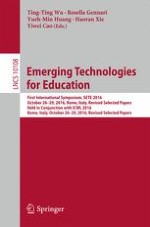2017 | OriginalPaper | Chapter
Improving Students’ English Technical Terms Learning and Willingness to Communicate Through Meaning Negotiation
Authors : Yaming Tai, Yu-Liang Ting, Pei-Shan Hsieh
Published in: Emerging Technologies for Education
Publisher: Springer International Publishing
Activate our intelligent search to find suitable subject content or patents.
Select sections of text to find matching patents with Artificial Intelligence. powered by
Select sections of text to find additional relevant content using AI-assisted search. powered by
